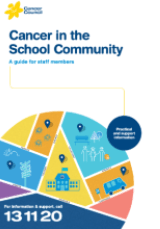- Home
- About Cancer
- Schools and teachers
- Cancer in the school community
- When a family member has cancer
- Changes in school performance
Changes in school performance
When a family member has cancer, the child will probably be preoccupied with what is going on at home. Studying and completing homework may not always be their main priority. Away from school, a young person may be acting as a carer, visiting the hospital, looking after younger siblings and taking on household duties. They may have limited time to socialise. In single-parent and separated families, the situation can become even more demanding for the student.
It is likely that the student’s academic performance will be affected. It can be helpful for the school liaison person to talk to the family about adjusting their expectations. While many families will hope their child can keep up with their schoolwork, it is important to identify changes in school performance and respond appropriately, such as by offering flexible due dates or tutoring.
If students whose family members have cancer are sitting NAPLAN or senior exams, they may qualify for special consideration. They may also be eligible to be considered for an access scheme for tertiary study.
When his little brother was having treatment, Alastair would have to study for exams in the hospital cafeteria. He said he felt like he was drifting in and out of worlds.
– Read more of Genevieve’s story
→ READ MORE: How your school can help
Podcast: Family Dynamics and Cancer
Listen to more episodes from our podcast for people affected by cancer
More resources
Claire Tobin, Principal Medical Advisor, Department of Education and Training, VIC; Dr Antoinette Anazodo, Paediatric and Adolescent Oncologist, Sydney Children’s Hospital and Prince of Wales Hospital, Director of The Sydney Youth Cancer Service, and Conjoint Senior Researcher, University of New South Wales, NSW; Lisa Barrow, Clinical Nurse Educator, Children’s Cancer Centre, Royal Children’s Hospital, Melbourne, VIC; Margo Bulic, Psychosocial Support Worker, CanTeen, ACT; Amber Copeland, 13 11 20 Consultant, Cancer Council Queensland; Donna Drew, Clinical Nurse Consultant, Paediatric Oncology/Palliative Care, Kids Cancer Centre, Sydney Children’s Hospital, Randwick, NSW; Allesha Fecondo, Education Consultant, Victorian Paediatric Rehabilitation Service, and Education Liaison, Ronald McDonald Learning Program, Ronald McDonald House Charities Australia, VIC; John Friedsam, General Manager of Divisions, CanTeen Australia, NSW; Pina Hutcheson, President, Catholic Primary Principals’ Association of WA; Cara Irvine, Year 8 Coordinator, Alfred Deakin High School, ACT; Andrew Long, Assistant Director, Policy and Research, Independent Schools Council of Australia, ACT; Dr Alistair Lum, Post-doctoral Research Fellow – Behavioural Sciences Unit, Sydney Children’s Hospital, University of New South Wales, NSW; Kristine Luszczynski, Learning Program Manager, Quality and Standards, Ronald McDonald House Charities Australia, NSW; Anita Neville, National Manager, Ronald McDonald Learning Program, Ronald McDonald House Charities Australia, VIC; NSW Department of Education, NSW; Mandy Roney, Consumer; Shannon Rush, Primary School Program Manager, Camp Quality, SA; Luke Wade, Education and Career Support Consultant, Redkite, QLD.
View the Cancer Council NSW editorial policy.
View all publications or call 13 11 20 for free printed copies.
Need to talk?
Support services
Coping with cancer?
Speak to a health professional or to someone who has been there, or find a support group or forum
Looking for transport, accommodation or home help?
Practical advice and support during and after treatment
Cancer information
Dealing with the diagnosis
Common reactions to a cancer diagnosis and how to find hope
Cancer in the School Community – Chapter 4
Click on the link above to download the information on this page as a PDF

